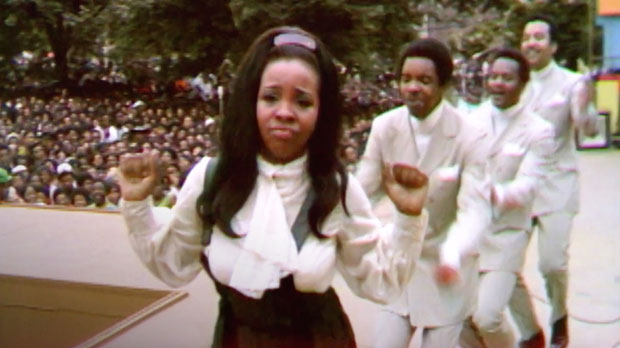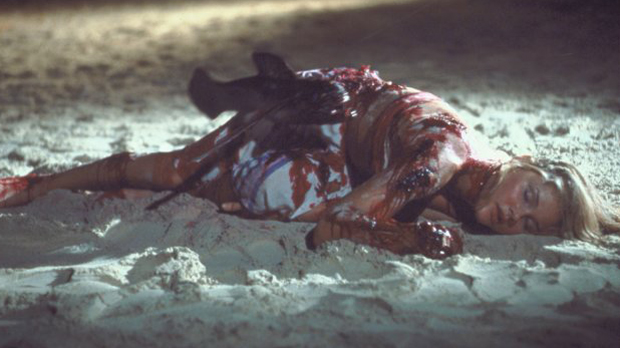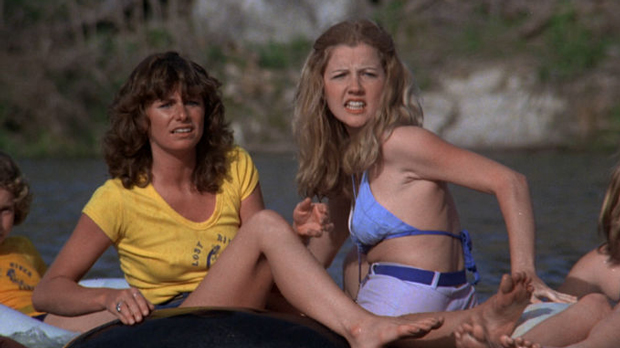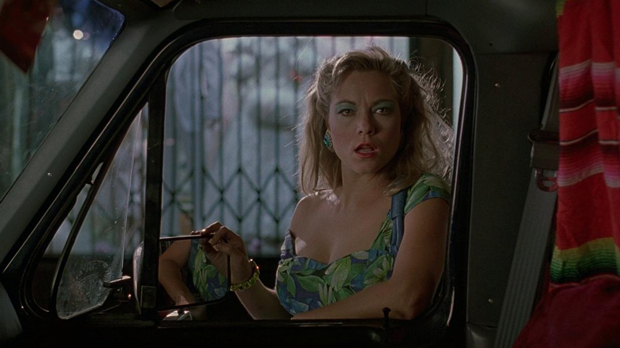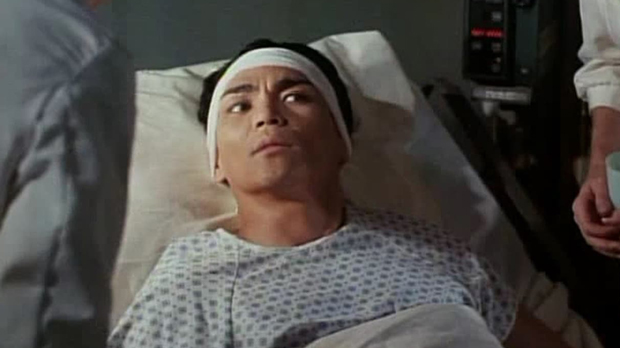 Summer of Soul (…Or, When the Revolution Could Not Be Televised) (2021) Searchlight/Documentary RT: 117 minutes Rated PG-13 (some disturbing images, brief mild language, drug material) Director: Ahmir “Questlove” Thompson Cinematography: Shawn Peters Release date: July 2, 2021 (Philadelphia, PA) Performances by Stevie Wonder, Nina Simone, Mahalia Jackson, Gladys Knight & the Pips, B.B. King, The 5th Dimension, Moms Mabley, The Staple Singers, Abbey Lincoln, Sly and the Family Stone, David Ruffin, Ray Barretto, Mongo Santamaria, The Edwin Hawkins Singers, Hugh Masekela, Max Roach, The Chambers Brothers, Herbie Mann, Babatunde Olatunji, Tony Lawrence, Reverend Jesse Jackson, John V. Lindsay. Appearances by Lin-Manuel Miranda, Luis Miranda, Chris Rock, Sheila E., Marilyn McCoo, Billy Davis Jr., Stevie Wonder, Reverend Al Sharpton, Mavis Staples, Charlayne Hunter-Gault, Greg Tate, Denise Oliver-Velez.
Summer of Soul (…Or, When the Revolution Could Not Be Televised) (2021) Searchlight/Documentary RT: 117 minutes Rated PG-13 (some disturbing images, brief mild language, drug material) Director: Ahmir “Questlove” Thompson Cinematography: Shawn Peters Release date: July 2, 2021 (Philadelphia, PA) Performances by Stevie Wonder, Nina Simone, Mahalia Jackson, Gladys Knight & the Pips, B.B. King, The 5th Dimension, Moms Mabley, The Staple Singers, Abbey Lincoln, Sly and the Family Stone, David Ruffin, Ray Barretto, Mongo Santamaria, The Edwin Hawkins Singers, Hugh Masekela, Max Roach, The Chambers Brothers, Herbie Mann, Babatunde Olatunji, Tony Lawrence, Reverend Jesse Jackson, John V. Lindsay. Appearances by Lin-Manuel Miranda, Luis Miranda, Chris Rock, Sheila E., Marilyn McCoo, Billy Davis Jr., Stevie Wonder, Reverend Al Sharpton, Mavis Staples, Charlayne Hunter-Gault, Greg Tate, Denise Oliver-Velez.
Rating: ****
Everybody’s heard of Woodstock, the three-day music festival held at a dairy farm in Bethel, NY in August 1969. Almost nobody’s heard of the Harlem Cultural Festival (aka “Black Woodstock”), a series of free concerts held in Mount Morris Park in summer ’69. Large crowds of black people gathered to enjoy music by artists like Stevie Wonder, The 5th Dimension, Nina Simone and Sly and the Family Stone. It was all captured on film by television producer Hal Tulchin, but he couldn’t generate any interest in the event deemed “too black” for the white mainstream. Consequently, the footage languished in Tulchin’s basement, unseen for 50 years until producer Robert Fyvolent acquired the rights. It was restored and edited down to serve as the backbone of Summer of Soul (…Or, When the Revolution Could Not Be Televised), a fascinating documentary from Roots drummer Ahmir “Questlove” Thompson that acts as both a concert film and history lesson.
Money was NOT the driving force behind the Harlem Cultural Festival. It was put on to celebrate black culture and promote black pride. What better way to accomplish both goals than showcasing the music that defines them- i.e. soul, blues, jazz and gospel. What a collection of talent! Besides the artists already mentioned, we get to see performances from Gladys Knight & the Pips (“I Heard It Through the Grapevine”), David Ruffin (doing a solo version of “My Girl”), B.B. King (“Why I Sing the Blues”) and The Chambers Brothers (“Uptown”). We also get to witness musical history being made by a duet between gospel legends Mahalia Jackson and Mavis Staples (“Precious Lord, Take My Hand”) while Reverend Jesse Jackson recalls the last hours of Martin Luther King Jr.’s life. Another highly emotional beat occurs when Marilyn McCoo and Billy Davis Jr. are moved to tears watching their younger selves perform “Aquarius/Let the Sun Shine In” with their former group (the 5th Dimension).
The music alone would be great, but Thompson uses it to add context to what was going on in black communities circa ’69. It was a tumultuous time what with the recent assassination of King not to mention those of JFK, little brother Bobby and Malcolm X earlier in the decade. By way of news and interview footage, we’re reminded of the riots that broke out following King’s murder. We’re also given a glimpse of the heroin epidemic that took hold of urban areas. The part that stands out for me is the juxtaposition of reactions to the moon landing. The patriotic excitement of white people is countered by less-than-enthusiastic reactions from black people, all of whom agree the money would have been better spent feeding their children and improving their neighborhoods. With apologies to the crew of Apollo 11, they make a good point.
I’m still getting back into the swing of things after my forced hiatus from the cinema, but movies like Summer of Soul (…Or, When the Revolution Could Not Be Televised) remind me of what I’ve been missing for over a year. It’s an amazing film! It’s also a terrific directorial debut for Thompson. It’s beautifully restored and brimming with joyous energy during the performances. What impresses me the most is how well-behaved the spectators are. Aside from a brief pushing incident quickly stopped by a few words from emcee Tony Lawrence, it doesn’t spiral out of control, not even with the Black Panthers providing security for one concert. According to one attendee, it was like going to a large backyard BBQ. In today’s heated social climate, I can easily see an attempt at an event like this ending in violence and rioting. In ’69, it was about solidarity while enjoying great music. Sure, it was political too, but that didn’t put a damper on the fun and joy. If only we could turn back time, right?
